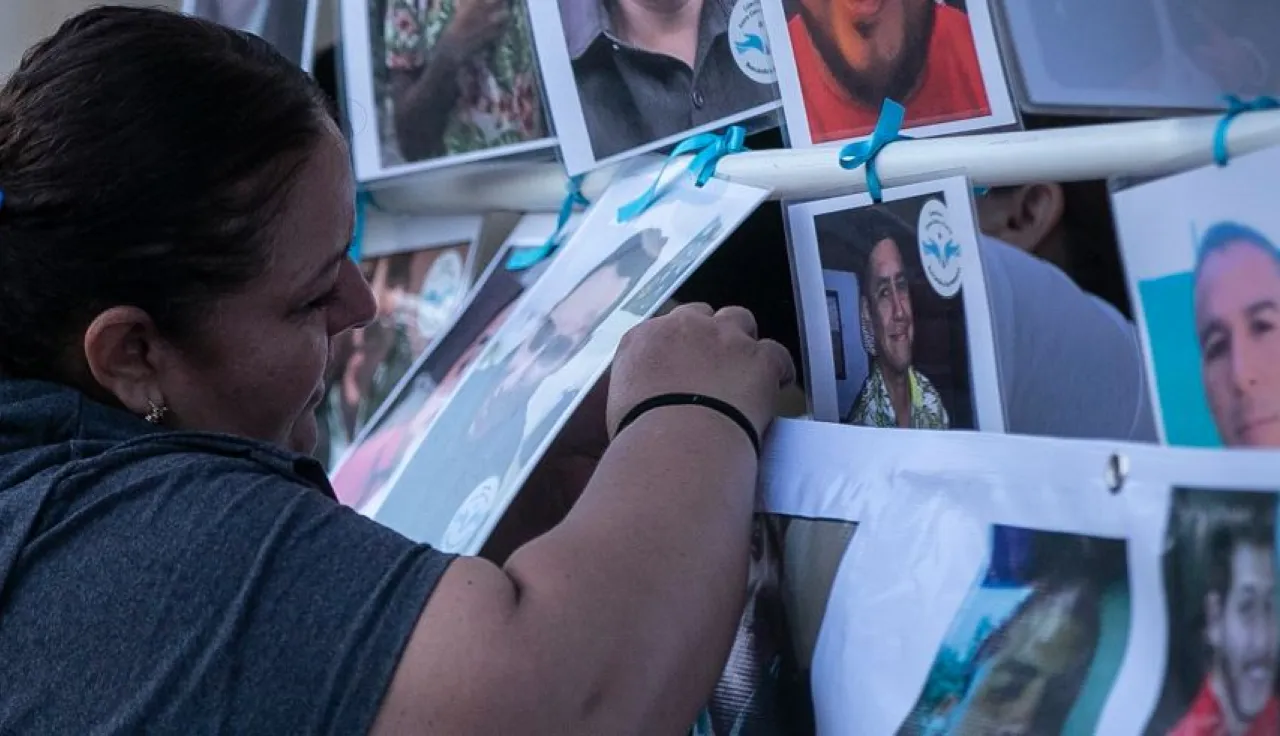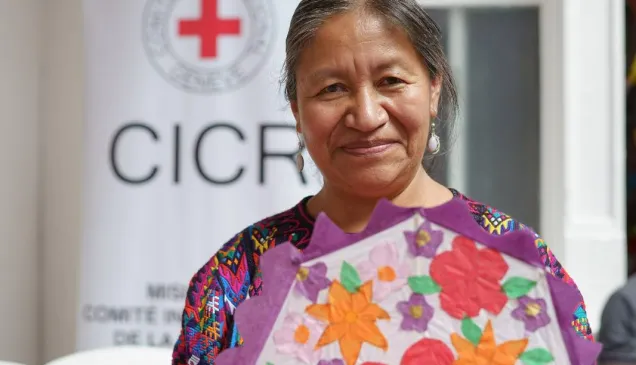Mexico and Central America: Violence jeopardizes thousands of lives

The ICRC's Regional Delegation for Mexico and Central America presented its Humanitarian Report 2022-2023, in which it warns of the profound humanitarian consequences associated with armed violence, such as disappearances, killings, internal displacement, and migration.
Mexico City (ICRC) - Every day, armed violence generates new victims in Mexico and Central America. The human suffering has reached profound and painful proportions, which is why it is urgent to recognize, address and prevent it, said the International Committee of the Red Cross (ICRC) in a presentation of its regional annual activity report.
"The pain of those searching for a loved one, of people forced to flee their homes to save their lives and those of their families, and of communities without access to essential services, is similar to that faced by people in other parts of the world affected by armed conflict", said Olivier Dubois, head of the ICRC's delegation for Mexico and Central America.
Violence in the region is an everyday reality in which victims need immediate attention. At the same time, it remains persistent and historical: its causes are deep-rooted. "It is in this difficult balance between the structural and the urgent, between addressing a problem that requires long-term solutions and dealing with and mitigating the permanent humanitarian consequences it generates, that the ICRC works in Mexico and Central America", said Dubois.
Protecting migrants and internally displaced people
ICRC notes that migration flows in the region increased and changed in 2022. This is reflected in the 974% increase of migration in transit through the southeast border of Honduras, compared with 2021, according to official data reported by the Observatorio de las Migraciones Internacionales en Honduras, and a 43.5% increase of migrants in facilities of the National Institute of Migration of Mexico compared with 2021, according to official national statistics.
The number of Caribbean and South American people transiting through Mexico increased and surpassed nationals from Central American countries. In the first months of 2023, there was an increase in asylum, which implicates efforts by migrant-receiving countries to respect the rights of these people like offering refuge, providing asylum, and not returning them to their country of origin.
The ICRC interviews migrants and holds a dialogue with relevant actors to learn about the main humanitarian consequences of violence and regional migration policy changes. The information gathered shows that they are at high risk of being victims of accidents, human smuggling networks, robbery, extortion, disappearance, and reduced access to humanitarian services along the way.
"The strengthening of migration controls in the region, the implementation of migration policies throughout the region, and misinformation expose people to increasingly dangerous routes to evade the control of the authorities, often with fatal consequences", said Olivier Dubois.
States have the primary responsibility to meet the assistance needs and ensure the protection of the rights of migrants. However, the ICRC is aware of the challenge when there's an increased number of people transiting through the region. The ICRC engages in confidential dialogue with the authorities to share observations and recommendations to respect and protect their integrity and dignity.
Internal displacement due to violence continues to be a reality in Mexico and Honduras. Displaced people are often faced with having to start from scratch and still need protection and security despite being displaced. The ICRC supports the authorities in providing mechanism that allow people to access their rights and helps many of them to resume their life projects.
Disappearances
One of the most dramatic humanitarian consequences in Mexico and Central America is disappearance: people who disappeared in past armed conflicts and remain unaccounted for, migrants who disappear and die en route, and people who disappeared because of violence.
"The duty to search, locate and identify -in the case of persons found deceased- lies with the authorities, and it is up to them to take all necessary measures to guarantee the rights of missing persons and their families, as well as to develop public policies to prevent and address the problem", Dubois said.
"Having centralized and updated registers that allow for the exchange of information between institutions and countries, effective mechanisms for families to report their cases, and institutions that have sufficient human resources to operate properly are essential in the humanitarian response", he emphasized.
In its report, the ICRC highlights the efforts made by countries in the region in 2022 to recognize and address this problem and the challenges that remain. The humanitarian organization worked with the authorities to improve the technical capacities of institutions and families to address their needs and strengthen their knowledge of their rights and their support networks at the regional level.
Other consequences of violence: lack of access to essential services
In addition to the visible consequences of displacement, deaths, and disappearances, violence generates other effects that disrupt community dynamics and impede access to essential services. Although these consequences are much more difficult to calculate, there are movement restrictions, mental health effects, and a lack of access to health or education in communities where armed groups are present. This jeopardizes the future of many children and young people and increases the vulnerability of communities.
"We are working to ensure that people with the highest risk and vulnerability in this context of insecurity are protected and assisted, and that their dignity is respected. It is essential that people affected by violence are at the center of any humanitarian response", said the head of the regional delegation.
People deprived of their liberty
The ICRC visits persons deprived of their liberty in 80 countries worldwide. It also carries out that activity in Nicaragua, El Salvador, Honduras, and Guatemala (where it visits young people).
In the region the ICRC works to ensure that the rights of persons deprived of their liberty are respected, including access to essential services and contact with their families. It works with the authorities to find alternatives to depriving people of their liberty and maintaining restrictive detention regimes. The findings of these visits are shared confidentially with the authorities.
Our action in numbers
The ICRC works with National Red Cross Societies and coordinates with the authorities to help mitigate the humanitarian consequences of armed violence. In 2022 the regional delegation for Mexico and Central America carried out the following:
About the International Committee of the Red Cross (ICRC)
The ICRC, founded in 1863, is an international humanitarian organization that is independent, neutral, and impartial with respect to the protection and assistance of those affect by armed conflict and other situations of violence. The organization is made up of 20,000 collaborators that work in 100 countries around the world. The ICRC is part of the International Red Cross and Red Crescent Movement, the world's oldest and largest, working hand-in-hand with Red Cross National Societies to conduct their work.
Media contact information:
Ana Langner, Public communication officer, Mexico: olangnerleyva@icrc.org
Laura Marcela Ortiz, Communication officer, El Salvador: lortizcolmenares@icrc.org, (503) 7603-9325
Luis Pedro Domínguez, Communication officer, Guatemala: ldominguezrosales@icrc.org
Bianca Paola Solórzano, Communication officer, Honduras: bsolorzanomejia@icrc.org



